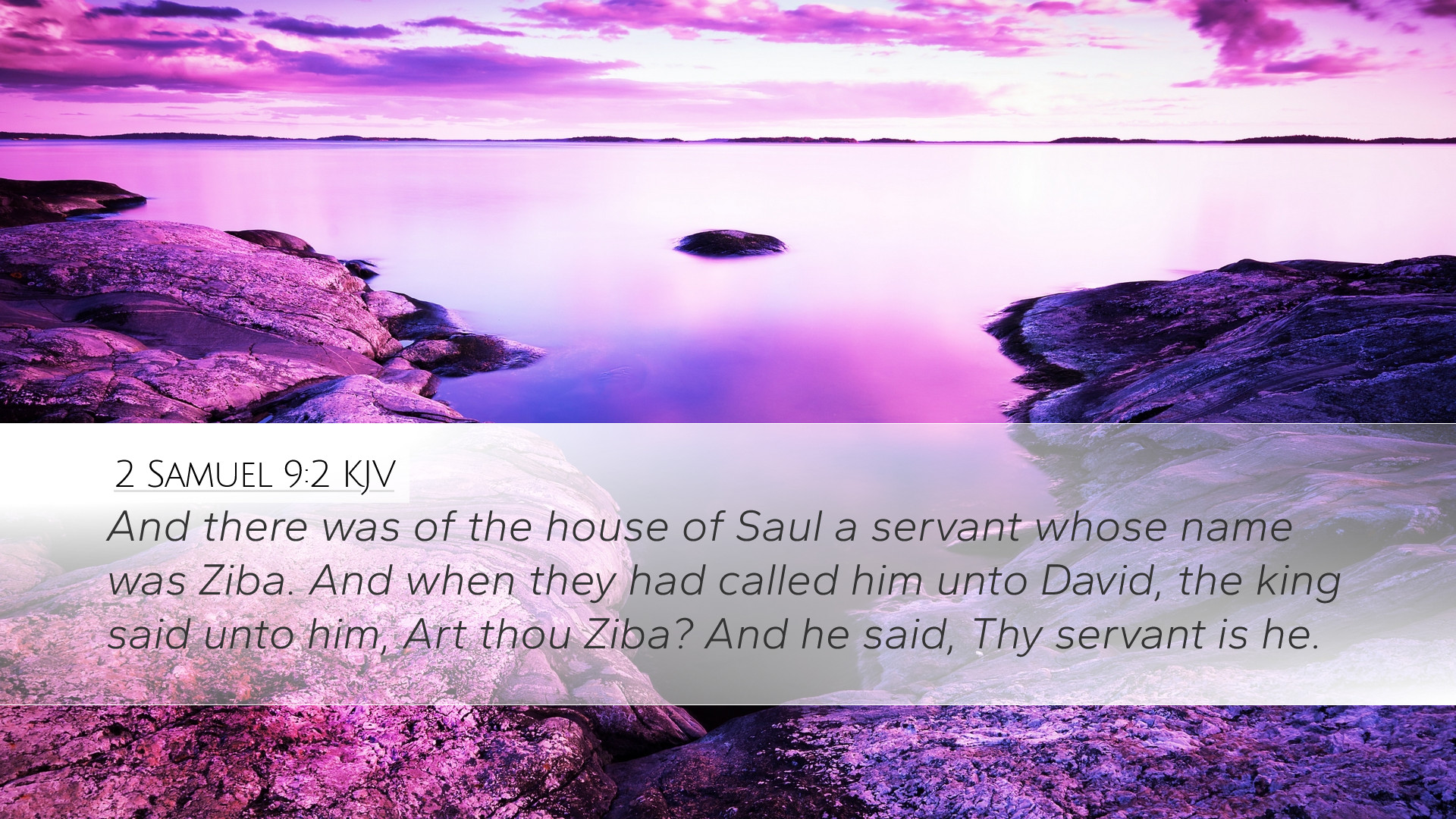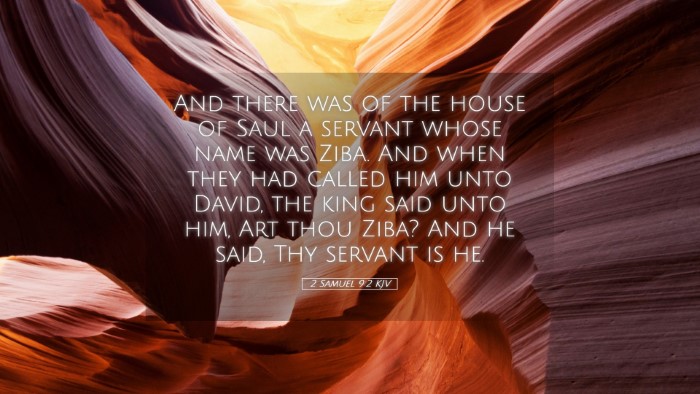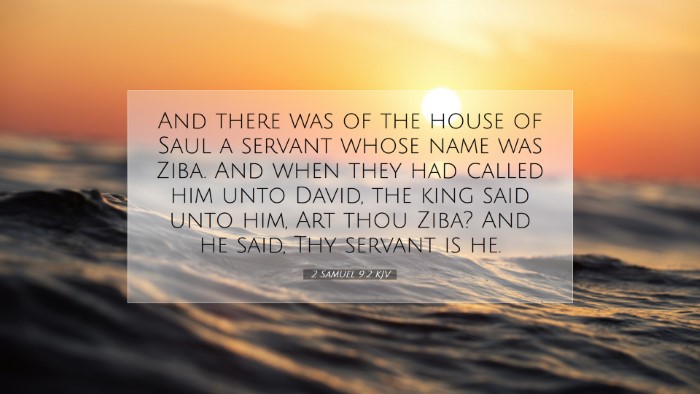Old Testament
Genesis Exodus Leviticus Numbers Deuteronomy Joshua Judges Ruth 1 Samuel 2 Samuel 1 Kings 2 Kings 1 Chronicles 2 Chronicles Ezra Nehemiah Esther Job Psalms Proverbs Ecclesiastes Song of Solomon Isaiah Jeremiah Lamentations Ezekiel Daniel Hosea Joel Amos Obadiah Jonah Micah Nahum Habakkuk Zephaniah Haggai Zechariah Malachi2 Samuel 9:2
2 Samuel 9:2 KJV
And there was of the house of Saul a servant whose name was Ziba. And when they had called him unto David, the king said unto him, Art thou Ziba? And he said, Thy servant is he.
2 Samuel 9:2 Bible Commentary
Commentary on 2 Samuel 9:2
Verse: "And there was of the house of Saul a servant whose name was Ziba. And when they had called him unto David, the king said unto him, Art thou Ziba? And he said, Thy servant is he."
Introduction
This passage occurs in a moment of grace within David's reign as king of Israel. It highlights the theme of loyalty, kindness, and the reverberations of covenant love within a narrative often overshadowed by rivalry and strife. Understanding this verse requires an exploration of the historical context, the intentions of King David, and the implications for the house of Saul.
Historical Context
The events of 2 Samuel 9 happen after the death of Saul and his sons, including Jonathan, David’s dear friend. Despite the violent conflicts that had marred their relationship, David seeks a way to honor Jonathan’s memory and to fulfill the covenant made between them. This aspect of David’s character — his commitment to kindness and loyalty — is crucial to understanding the narrative.
Analysis of the Text
David's Inquiry
“And there was of the house of Saul...” The mention of Saul's house at the outset reminds the readers of the strained history between his lineage and David's. David’s inquiry into Saul’s household indicates a shift in the narrative from enmity to potential reconciliation.
Servanthood of Ziba
When Ziba is identified as a servant of Saul, it enhances the understanding of David's motives. Ziba represents the remnants of Saul’s household, emphasizing David's desire to show loyalty and kindness despite past grievances.
- Matthew Henry Commentary: Henry notes that David’s solicitude for any surviving members of Saul’s family reflects his character — he was not seeking vengeance against his enemies but rather extending grace.
- Albert Barnes Commentary: Barnes adds that the presence of a servant like Ziba signifies the complexities of allegiance in the ancient context, where loyalties could shift rapidly.
- Adam Clarke Commentary: Clarke highlights the significance of a servant in this narrative, suggesting that Ziba represents more than a mere servant; he is a bridge between two warring factions.
The Role of Ziba
David’s call to Ziba—“Art thou Ziba?”—is pivotal. Ziba's reply, “Thy servant is he,” is significant in acknowledging his role and responsibility. This exchange marks the beginning of an important dialogue that will lead to further actions regarding Mephibosheth, Jonathan’s son.
This interaction illustrates the respect still held in a servant’s acknowledgment of the king. Ziba's readiness to respond also denotes a trust in David's character as king despite the tumultuous history of their houses.
Theological Reflections
Covenantal Loyalty
This passage serves as a reminder of God’s faithfulness in the context of human warfare and rivalry. The covenant friendship between David and Jonathan remains a guiding principle for David’s actions.
- God’s Faithfulness: David's willingness to seek out the remnants of Saul’s lineage illustrates how future grace can be anchored in past commitments.
- Reflection of God’s Character: This act of kindness reflects God’s nature — one that is rooted in mercy and grace, urging believers to embody these qualities in their relationships.
Lessons for Leadership
For pastors and leaders, David’s inquiry into Ziba’s existence presents vital lessons about leadership ethics. Effective leaders do not solely act for themselves; they consider the broader implications of their actions on others.
- Valuing Relationships: Leaders are called to cultivate relationships that honor commitments and display kindness, particularly towards those who may be perceived as 'enemies.'
- Generosity in Leadership: David’s approach serves as a model for selflessness in leadership, where grace meets authority.
Conclusion
In examining 2 Samuel 9:2, we see an encapsulation of themes that resonate within the broad tapestry of biblical narrative: grace, loyalty, and the complexities of human relationships amidst divine providence. Through Ziba’s introduction into David’s court and his role as a link to Jonathan, readers are invited to reflect upon their own commitments, the nature of servanthood, and the profound implications of grace in their lives.


